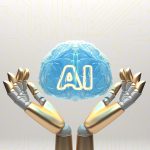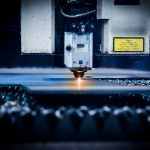The Human Resource (HR) industry is changing. No longer is it going to be a solely human-run career choice. Leaders in many industries are now looking to optimise their HR sectors to bring in the combination of human and automated work.
The introduction of artificial intelligence (AI) in HR is being done to promote a more personal, intuitive platform within businesses. A platform that requires the entire team to work together to create a fluent partnership between themselves and AI.
This sector is sure to become far more technologically advanced in the future; but how has AI already transformed the HR industry in businesses globally? From streamlining sectors to work increasingly smarter to making efficiency levels better than ever, here are five ways in which artificial intelligence is changing and improving the HR industry.
5 ways AI is changing and improving the HR industry
1. Administration Automation
Within the daily HR tasks, AI is working to improve the operations of low-value, administrative tasks. These may seem rather minute compared to the other challenging tasks taken on by the HR team in many businesses. However, AI being able to have individual control over various administrations saves those in this sector a huge amount of time. The introduction of AI looks to cover the simpler and tedious jobs as well as those that are more important.
For example, through deep learning workstations, AI can cover tasks such as scheduling meetings into the calendar and office spaces, and even provide specific equipment in the matter of a presentation. As well as this, AI can work to speed up the recruitment process by evaluating interview questions, aiding to find the right candidate in efficient time.
It has actually been found in a recent study conducted by Eightfold AI that those who work within HR and use AI software have a 19% higher rate of effectiveness in comparison to those who work manually, without any AI implemented into the processes.
2. Training
AI has the ability to hold quantities of previously accounted data from years of sales, employee development, and even health & safety training. This is a great, credible source that can be easily used in new staff training programmes, ensuring that they are completely equipped with everything they need to start in the HR industry.
By using company-related online training schemes with the involvement of AI, the platform can create a personalised pathway for every individual new starter. This makes it easier to focus on any weaknesses they may have that are tasks within the HR industry – including organisational skills, planning or coordinating.
The process can also work to polish on already-gained skills to better prepare them for joining the HR team. Through machine learning analysing the candidate, and the needs of the company, AI uses data to fill in any possible holes the new starter may have. This clearly facilitates two very important attributes: the business and the employee.
3. Employee Retention
AI can take on preference and employee performance-based analysis for each team member within HR. This is a huge benefit for those who are leaders of the sector, as they can understand the mindset of their employees without even needing to ask a question.
Machine learning can help the managers understand which colleagues deserve to receive a pay increase due to work efforts, and even those who are on their way out with a notice being on its way very soon. An example of this is IBM’s AI system, which can predict those who are planning on leaving months before they do so with a 95% accuracy rating.
Having such information early allows managers to act accordingly, by opening up vacancies or introducing enhanced retention rates that make those who are not performing well flag up. It can then arrange a meeting with HR to resolve outstanding issues or lead to a termination of a contract.
4. Reduction Of Bias
As much as employers try to focus on only hiring based on qualifications and experience, it is hard to ignore some additional factors that may be subconsciously influencing the final choice whether they recruit a certain person or not. This is, of course, employment bias that is extremely frowned upon within all business industries, but sometimes cannot be helped.
Recruiters lean to those who are most like them and employ based on the point of how well they will fit into the team, their gender, age and in some cases even race. All of these perceptions become invalid through the use of AI as a point in the recruitment process.
AI and machine learning are being used to eliminate any recruitment biases by implementing algorithm-built assessment platforms. This ensures there is a diverse pool of potential candidates that come in for the formal interview, based solely from their assessment answers.
Having this available when hiring – something that the HR department is likely to be a huge part of – means that bias can easily be removed. Even if the assessment is found to be rather perceptive, it can be re-programmed; it’s much harder to take bias away from a human.
5. Employee Satisfaction
The HR team is the first port of call when it comes to ensuring staff are happy. It is their job to focus on relationships, any workplace concerns, and overall building the type of environment that people will enjoy working in.
However, it is all too regular for colleagues to take the matter into their own hands and keep the troubles to themselves. This means that the HR team only becomes aware of the issue when the employee hands in their resignation. This shouldn’t be happening and, with the use of AI, it can be avoided.
The introduction of AI means that HR can now get an insight into any possible concerns of queries bouncing around their team of workers and work to change them, even anonymously. This is done through sentiment analysis, a kind of survey like form of data collection in an analytics tool. From here, the HR team can uncover any possible concerns or attitude changes, and work out solutions for each of them.
Summary
AI is clearly merging into the HR industry across many industry sectors. This includes being able to become a personal assistant to the team, analyse skills and performance levels of colleagues in different sectors. It also acts as a better source when it comes to the recruitment process.
With so much already covered by AI, it is almost certain that it will continue delving deeper into the industry, to become an integral part of the HR team, alongside the human workers.
While AI is very much an impressive and beneficial feature that can benefit the HR sector greatly, it will not replace the human workers for a long time. With a side of HR focusing on the emotional aspects of working with a business, it is likely this is something a robot or machine will not be best at. Human connection is something that is somewhat irreplaceable. So for now, AI is the best focusing on tasks, implementing better work efficiency, and aiding the HR in bettering the entire office.










